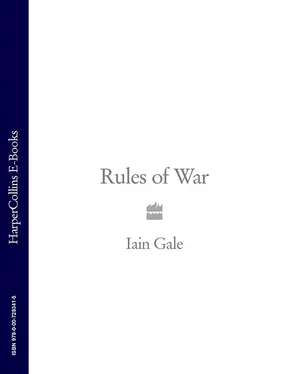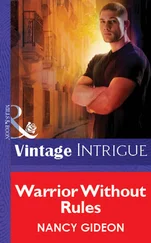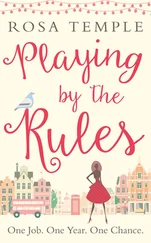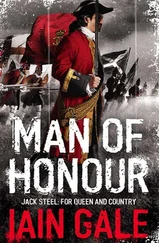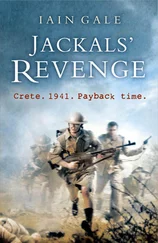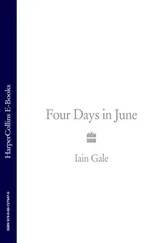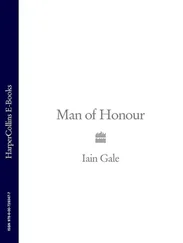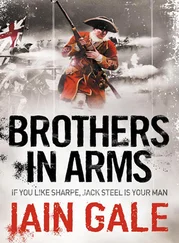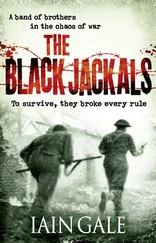1 ...8 9 10 12 13 14 ...17 Steel looked again at the device on the colour. He had missed something. But there was no mistaking it now. A red cross on a white ground, and there, in its centre, a gold harp. This was no St George’s Cross, but the flag of an Irish regiment.
‘We’ve got to warn him, Jacob.’
But his words were lost. It was over in an instant.
As they watched the densely-packed Irish infantry opened up against the bemused Dutch with a well-timed and precise volley. For a moment the street was obscured in white smoke. When it cleared Steel felt sick to the stomach. The Irish volley had ripped into the uncertain Dutch at such close range that hardly a musketball had not found its mark. Fully three score of the Dutch infantry lay dead and dying on the cobbles and there at their head Steel could see the unmistakable, blond-haired figure of Major van Cutzem.
Slaughter spat on the cobbles: ‘Poor bugger. He can’t have realized.’
‘So much for bloody chivalry.’
The Irish gave out a cheer, but they did not pursue the retreating Dutch survivors. This was impressive stuff. They looked as if they meant to stand and if the allies were to secure this place, Steel knew he would have to take the fight to them.
‘Tarling, Hancock, Mackay. Each of you find ten men and follow me. Sarn’t Slaughter, find the others, and Mister Hansam. Tell them we have business at the church.’
With the thirty men following close behind, Steel moved quickly up the street towards the red-clad infantry, who held their fire. He could see the colour more clearly. A white ground bearing a red cross; yellow facings and a red cross – Irish Jacobites. He knew these men now: Clare’s regiment. Dragoons originally, now converted to a regiment of foot. Their commander was the exiled Viscount Clare, Charles O’Brien. Steel had known O’Brien once, in what seemed now a previous life, before the Jacobites had charmed the young Irishman across to their ranks with talk of the right of kings and divine monarchy. Then they had both been younger. Two impressionable ensigns of foot, fighting the French in a place called Neerwinden where the river fed down to the sea and where King William’s British army had run from the French with its tail between its legs and left six thousand men dead on the field. How far they had come since then, he thought. And what quirk of fate, he wondered, had brought Clare to face him here.
At forty yards out from the Irishmen, Steel halted the Grenadiers. There were around thirty up with him now. It was hardly a fair fight. Thirty against nigh on a hundred men. Perhaps it might be more prudent to wait for assistance. But then, Steel was not noted for his caution.
‘Grenadiers, uncap your fuses.’ They would do it the hard way.
Slaughter looked at him quizzically. ‘Do we attack, sir?’
‘What else can we do? Have the men light their bombs.’
Slaughter had barely opened his mouth to deliver the command when with a great shout, from a small street to the right, Argyll and the best part of two companies of his vengeful Scots infantry burst out and crashed into the flank of the Irishmen.
‘Bugger the grenades, Sarn’t.’ He raised his voice. ‘Unsling your fusils. Company, fix bayonets.’
The Grenadiers carefully replaced their bombs in the leather pouches and with a swift motion twisted the new-fangled socket bayonets on to the muzzles of their fusils.
‘With me. Charge!’
With his own gun still slung across his back and his great sword raised high above his head, Steel began to run towards the mêlée at the end of the street. Argyll’s men had come round the side and front of the Irish line and partly blocked their view of Steel, who seized the chance. Reaching the line he threw himself into the crush and connected with an ensign of Irish dragoons who extended his sword-arm and lunged at Steel’s chest. He parried away the cut with ease and dealt the boy a blow with the hilt of his sword which knocked him out cold and sent him to the ground.
Steel hissed at Slaughter: ‘By God, Jacob. I wouldn’t like to be one of Clare’s men. You know Argyll believes them to be the devil’s soldiers.’
He saw the duke wielding a Highland broadsword almost as heavy as his own. His face was frozen in a rictus of fury and he was chopping his way through a forest of Irishmen, severing limbs and heads as he went.
Argyll caught sight of Steel: ‘Steel, by God. What luck this? A whole regiment of heathens. Papists. Heretics!’ Possessed by his fervour, he ran headlong into a group of three Irish dragoons spitting one on his sword and punching another full in the face with his gloved fist before slitting his throat.
Steel looked at Slaughter and knew what was required. Both men ran to help Argyll who was now locked in a duel with the remaining dragoon and had not seen a fourth come round behind him. Steel fell upon the man and with a savage uppercut of his blade, sliced the back of his head. To his left four more dragoons appeared, intent apparently on saving their comrade engaged with Argyll. Steel could see now that the man was an officer and then recognized him as O’Brien himself. He had been a noted swordsman when they had fought under the same colours and Steel could see that he had not lost his touch. Every blow that Argyll aimed towards him, O’Brien met with an expert parry. As the dragoons hurried to rescue their commander, Steel and Slaughter turned to face them and he noticed that they had been joined by a half-dozen of the Grenadiers.
Slaughter hissed at them. ‘You took your bloody time. Corporal Taylor, Mulligan, you others there, with me. The rest of you, with Captain Steel.’
Steel squared up to one of the dragoons and feinting to the left with a blow of his sword dealt him a tremendous kick in the groin which felled him to the ground. As each Grenadier found a man in turn, Steel noticed that Argyll had been joined by more of his own men, including one of his sergeants, a huge, barrel-chested brute armed with what looked like a captured cavalry sabre. He and the duke were fighting O’Brien together now yet still it seemed as if the Irishman was more than capable of beating them off. Steel cut to the right to parry a thrust from a dragoon’s bayonet and on the return stroke pierced the man through the stomach. Slaughter had dispatched another of the enemy and for an instant the two men stood uncertain of who to take on next. At that moment a clatter of hooves on cobbles announced the arrival of a party of redcoated English dragoons.
At their head rode a young cornet of horse wearing a broad grin. He was shouting like an excited schoolboy. ‘The field is ours. The field is ours. The French are retreating, the day is ours, my boys.’
A single shot broke against the noise of steel on steel as Slaughter, who had unslung his fusil from his back, fired into the air. With the cornet’s words, it was enough. Grenadiers and Irishmen alike broke apart in their individual combats and stood at the en-garde , uncertain of what to do.
O’Brien disengaged from Argyll who, along with the big redcoat sergeant slowly backed away. Taking care still not to quite drop his guard, the Irishman gently raised the tip of his sword until it was pointing skywards and as the general stood motionless, his own blade still held out before him, the young Jacobite reversed his hand so that the blade now pointed directly towards the ground. Argyll watched for a moment and then, as Steel looked on, gave a barely perceptible nod towards the sergeant who, with a great lunge of the sort one might execute in a fencing salle, sprang towards O’Brien and buried his blade deep in his heart. The Irishman’s soft, green eyes expressed his utter surprise, then as they glazed over, he dropped his sword, grasped at the blade in his chest and fell to the ground. Steel was lost for words. The sergeant straightened up, withdrew the long blade and turned to Argyll.
Читать дальше
